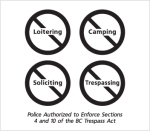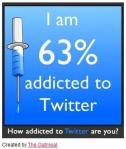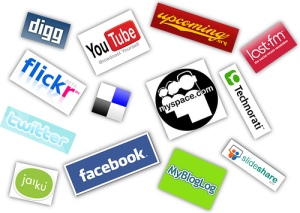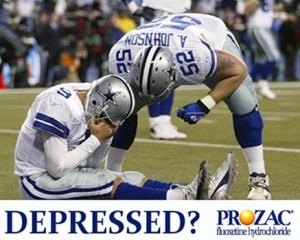 I have been working with clients and their CRM programs for some time, and I have always been pretty amazed at how lousy so many of them are. Not that these companies aren’t interested in having more loyal customers (after all, loyalty = increased share of wallet), it’s just that other factors seem to come into play that impede that progress, or they just break some simple rules. So here are some issues with CRM I have come across, and a few suggestions how companies can improve their programs.
I have been working with clients and their CRM programs for some time, and I have always been pretty amazed at how lousy so many of them are. Not that these companies aren’t interested in having more loyal customers (after all, loyalty = increased share of wallet), it’s just that other factors seem to come into play that impede that progress, or they just break some simple rules. So here are some issues with CRM I have come across, and a few suggestions how companies can improve their programs.
Oh, and before I begin, for the record, I want to be clear about what I believe CRM is for – it’s to build advocacy for your brand. In essence, it’s communicating with your 10,000 customers in a way that makes them feel like you’ve only got 10.
Okay, with that said, here we go.
9 Reasons why your CRM sucks:
 1. You think CRM is a just direct mail program. How many times, as a consumer, have you received a direct mail offer from a company that ‘knows’ you, but they’ve sent you something ill timed (like a limited time, 15% off oil change coupon, the week after you got your oil changed) or offering you something you don’t want or need (like a product you’ve already bought)? The reason why this happens is that many companies believe that CRM is just a database for addresses, and to cut down on the cost of developing several communications, they use the entire list to blast out blanket offers.
1. You think CRM is a just direct mail program. How many times, as a consumer, have you received a direct mail offer from a company that ‘knows’ you, but they’ve sent you something ill timed (like a limited time, 15% off oil change coupon, the week after you got your oil changed) or offering you something you don’t want or need (like a product you’ve already bought)? The reason why this happens is that many companies believe that CRM is just a database for addresses, and to cut down on the cost of developing several communications, they use the entire list to blast out blanket offers.
I’ve been told several times to send out a direct mail offer with multiple offers to the entire list, because at least one of the offers applies to everyone on the list.
This doesn’t create customer loyalty. It’s an inauthentic offer that makes us feel like customer number 9,872.
 2. Garbage in = Garbage out. Many companies don’t do a good job of purging customers after they have bought a certain product or service. Generally because this is a manual process and some one just didn’t get to it. As a result, customers get offers for things they already have. What’s worse, the offers they receive generally offer a better deal than they originally received. This is a good example of how a company can actually pay money to piss their customers off. So always make sure that you have a quality assurance mechanism in place for data entry or find a way to automate it.
2. Garbage in = Garbage out. Many companies don’t do a good job of purging customers after they have bought a certain product or service. Generally because this is a manual process and some one just didn’t get to it. As a result, customers get offers for things they already have. What’s worse, the offers they receive generally offer a better deal than they originally received. This is a good example of how a company can actually pay money to piss their customers off. So always make sure that you have a quality assurance mechanism in place for data entry or find a way to automate it.
 3. You communicate too much. I hate to call a company out, but Amazon, if you’re listening, stop with the emails already. I probably receive an email offer once every two days from Amazon. I’m sorry, but I don’t read books that fast. If I did, I’d be much smarter. All this extra communication does is annoy me and makes me immediately delete your emails. Good thing for Amazon is that they’re too big to care. But if you’re not a monopoly, please heed this advice: Unless you’re my best friend (which you’re not), don’t talk to me all the time.
3. You communicate too much. I hate to call a company out, but Amazon, if you’re listening, stop with the emails already. I probably receive an email offer once every two days from Amazon. I’m sorry, but I don’t read books that fast. If I did, I’d be much smarter. All this extra communication does is annoy me and makes me immediately delete your emails. Good thing for Amazon is that they’re too big to care. But if you’re not a monopoly, please heed this advice: Unless you’re my best friend (which you’re not), don’t talk to me all the time.
 4. Everything is an offer. If you want to build loyalty with me, offer me something that isn’t an offer. I wrote a post about this a while ago about the power of ‘Thank You’. If you want me to like you more, next time you speak with me, try giving me helpful advice on what I have just bought (reinforce my good decision to go with you), or give me something I’m not expecting, or, better yet, connect me to others who have bought the same thing. Perhaps we can build a community of brand advocates for you.
4. Everything is an offer. If you want to build loyalty with me, offer me something that isn’t an offer. I wrote a post about this a while ago about the power of ‘Thank You’. If you want me to like you more, next time you speak with me, try giving me helpful advice on what I have just bought (reinforce my good decision to go with you), or give me something I’m not expecting, or, better yet, connect me to others who have bought the same thing. Perhaps we can build a community of brand advocates for you.
 5. You use contests to collect addresses. Not good. More often than not people will enter your contest to win the contest. They have no interest in your products or services. That whole “No Purchase Necessary” thing is hard to distinguish between who is interested and who isn’t. But if you have to run a contest, here’s a good tip, start your list with with the people who actually bought something.
5. You use contests to collect addresses. Not good. More often than not people will enter your contest to win the contest. They have no interest in your products or services. That whole “No Purchase Necessary” thing is hard to distinguish between who is interested and who isn’t. But if you have to run a contest, here’s a good tip, start your list with with the people who actually bought something.
Of course another way to build up your list is to offer a discount on a future purchase, and don’t just make it a blanket offer. If possible, make the discount relevant to their purchase. For example, if you’re a cable provider, offer a free on demand movie or discount on a specialty channel. Don’t offer a 25% discount on your phone service.
 6. You think short term. Many companies make the mistake of believing that CRM is something that migrates customers from interested to engaged to advocacy in 6 months. It doesn’t work like that. How long do you date someone before asking them to marry you? CRM takes time. And remember the goal – advocacy. It may not mean an increase in share of wallet, but it could mean an increase in WOM and new customers. So don’t be pushy. Customers are a skeptical lot to start out with.
6. You think short term. Many companies make the mistake of believing that CRM is something that migrates customers from interested to engaged to advocacy in 6 months. It doesn’t work like that. How long do you date someone before asking them to marry you? CRM takes time. And remember the goal – advocacy. It may not mean an increase in share of wallet, but it could mean an increase in WOM and new customers. So don’t be pushy. Customers are a skeptical lot to start out with.
 7. You didn’t talk to actual customers before offering them something. When you get together with friends and talk about companies, you either praise them or kill them with respect to their: customer service, call center, product, locations, parking, price, etc. Everyone’s got an opinion. So why is it that so many companies embark on CRM programs without talking to a single soul first? If you want to know how to improve your relationships with your customers, try talking to them. And here, qualitative trumps quantitative results. Get to know what your customers really want before you begin.
7. You didn’t talk to actual customers before offering them something. When you get together with friends and talk about companies, you either praise them or kill them with respect to their: customer service, call center, product, locations, parking, price, etc. Everyone’s got an opinion. So why is it that so many companies embark on CRM programs without talking to a single soul first? If you want to know how to improve your relationships with your customers, try talking to them. And here, qualitative trumps quantitative results. Get to know what your customers really want before you begin.
And don’t just use tools like Twitter Search, Google Alerts or BingTweets to eavesdrop on them. You can use those tools to find out if you’re doing a good job or not. But don’t use them as the foundation of your CRM program.
 8. Your CRM program doesn’t include other inbound/outbound areas. Cardinal sin. If your call centers do not have access to customer information or if your direct mail agency doesn’t have access to what transpired on your Twitter feed, you stand a very good chance of making yourself look like you don’t listen. Make sure any time there is a communication with a customer that his/her record is updated (if it is relevant). If something was solved in the call center, but the customer’s record isn’t de-duped for it, they can receive a communication about the same thing, thereby eliminating the two-way conversation we’re all trying to create.
8. Your CRM program doesn’t include other inbound/outbound areas. Cardinal sin. If your call centers do not have access to customer information or if your direct mail agency doesn’t have access to what transpired on your Twitter feed, you stand a very good chance of making yourself look like you don’t listen. Make sure any time there is a communication with a customer that his/her record is updated (if it is relevant). If something was solved in the call center, but the customer’s record isn’t de-duped for it, they can receive a communication about the same thing, thereby eliminating the two-way conversation we’re all trying to create.
 9. You’re not really listening or helping. This is my last point, but it’s pretty significant. One of the ways to build loyalty through CRM is to create a dialogue with your customers. If they feel like you’re listening, that makes them feel like they are important to you. Do not make the critical mistake of giving them avenues to reach you, like a call center, then putting them on hold for 30 minutes, making them listen to the pre-recorded message “You call is important to us…”. If you want to build some loyalty, you have to give them a reason to be loyal. And being helpful helps. Perhaps one of the benefits of your CRM program could be immediate access to a representative when they call, or anticipating problems they may have and delivering solutions to them proactively. Don’t make them come to you. Show them that you care.
9. You’re not really listening or helping. This is my last point, but it’s pretty significant. One of the ways to build loyalty through CRM is to create a dialogue with your customers. If they feel like you’re listening, that makes them feel like they are important to you. Do not make the critical mistake of giving them avenues to reach you, like a call center, then putting them on hold for 30 minutes, making them listen to the pre-recorded message “You call is important to us…”. If you want to build some loyalty, you have to give them a reason to be loyal. And being helpful helps. Perhaps one of the benefits of your CRM program could be immediate access to a representative when they call, or anticipating problems they may have and delivering solutions to them proactively. Don’t make them come to you. Show them that you care.
In any event, what’s important to realize about CRM is this:
CRM is time consuming, frustrating to implement, and it costs money.
That’s why it’s so easy to do it badly or dump it when times get bad. But if Frederick Reichheld, the loyalty expert, is correct by saying, “the one thing successful companies have in common are customers who would recommend their company to others”, my question to you is, how can you not afford to do CRM, and do it well?
Filed under: CRM, Marketing | Tagged: amazon, bingtweets, CRM, customer loyalty, google alerts, twitter search | 3 Comments »




 This is a post for Mr. Over-Tweet. You know who you are, but you probably won’t have time to read this. After all, you’re too busy enthralling us, 140 characters at a time.
This is a post for Mr. Over-Tweet. You know who you are, but you probably won’t have time to read this. After all, you’re too busy enthralling us, 140 characters at a time.  This relatively short post is for all of you out there who think that brands are the sole responsibility of the marketing department.
This relatively short post is for all of you out there who think that brands are the sole responsibility of the marketing department.  I don’t claim to be the savviest marketer in the world, but as a consumer, I do know what annoys me – and generally it falls in the category of being mis-targeted. I can forgive traditional media for its transgressions by showing me commercials that aren’t meant for me (hey, we’ve all mistakenly watched a full year of Grey’s Anatomy before, right guys?). But when online ads are blowing it, I blow my lid.
I don’t claim to be the savviest marketer in the world, but as a consumer, I do know what annoys me – and generally it falls in the category of being mis-targeted. I can forgive traditional media for its transgressions by showing me commercials that aren’t meant for me (hey, we’ve all mistakenly watched a full year of Grey’s Anatomy before, right guys?). But when online ads are blowing it, I blow my lid.  Online Spin just released an
Online Spin just released an  There’s no question that social media is here to stay. Technology has given us a voice, and all signs point to us wanting to be heard.
There’s no question that social media is here to stay. Technology has given us a voice, and all signs point to us wanting to be heard.  I have been working with clients and their CRM programs for some time, and I have always been pretty amazed at how lousy so many of them are. Not that these companies aren’t interested in having more loyal customers (after all, loyalty = increased share of wallet), it’s just that other factors seem to come into play that impede that progress, or they just break some simple rules. So here are some issues with CRM I have come across, and a few suggestions how companies can improve their programs.
I have been working with clients and their CRM programs for some time, and I have always been pretty amazed at how lousy so many of them are. Not that these companies aren’t interested in having more loyal customers (after all, loyalty = increased share of wallet), it’s just that other factors seem to come into play that impede that progress, or they just break some simple rules. So here are some issues with CRM I have come across, and a few suggestions how companies can improve their programs. 1. You think CRM is a just direct mail program. How many times, as a consumer, have you received a direct mail offer from a company that ‘knows’ you, but they’ve sent you something ill timed (like a limited time, 15% off oil change coupon, the week after you got your oil changed) or offering you something you don’t want or need (like a product you’ve already bought)? The reason why this happens is that many companies believe that CRM is just a database for addresses, and to cut down on the cost of developing several communications, they use the entire list to blast out blanket offers.
1. You think CRM is a just direct mail program. How many times, as a consumer, have you received a direct mail offer from a company that ‘knows’ you, but they’ve sent you something ill timed (like a limited time, 15% off oil change coupon, the week after you got your oil changed) or offering you something you don’t want or need (like a product you’ve already bought)? The reason why this happens is that many companies believe that CRM is just a database for addresses, and to cut down on the cost of developing several communications, they use the entire list to blast out blanket offers.  2. Garbage in = Garbage out. Many companies don’t do a good job of purging customers after they have bought a certain product or service. Generally because this is a manual process and some one just didn’t get to it. As a result, customers get offers for things they already have. What’s worse, the offers they receive generally offer a better deal than they originally received. This is a good example of how a company can actually pay money to piss their customers off. So always make sure that you have a quality assurance mechanism in place for data entry or find a way to automate it.
2. Garbage in = Garbage out. Many companies don’t do a good job of purging customers after they have bought a certain product or service. Generally because this is a manual process and some one just didn’t get to it. As a result, customers get offers for things they already have. What’s worse, the offers they receive generally offer a better deal than they originally received. This is a good example of how a company can actually pay money to piss their customers off. So always make sure that you have a quality assurance mechanism in place for data entry or find a way to automate it. 3. You communicate too much. I hate to call a company out, but
3. You communicate too much. I hate to call a company out, but  4. Everything is an offer. If you want to build loyalty with me, offer me something that isn’t an offer. I wrote a post about this a while ago about the
4. Everything is an offer. If you want to build loyalty with me, offer me something that isn’t an offer. I wrote a post about this a while ago about the  5. You use contests to collect addresses. Not good. More often than not people will enter your contest to win the contest. They have no interest in your products or services. That whole “No Purchase Necessary” thing is hard to distinguish between who is interested and who isn’t. But if you have to run a contest, here’s a good tip, start your list with with the people who actually bought something.
5. You use contests to collect addresses. Not good. More often than not people will enter your contest to win the contest. They have no interest in your products or services. That whole “No Purchase Necessary” thing is hard to distinguish between who is interested and who isn’t. But if you have to run a contest, here’s a good tip, start your list with with the people who actually bought something.  6. You think short term. Many companies make the mistake of believing that CRM is something that migrates customers from interested to engaged to advocacy in 6 months. It doesn’t work like that. How long do you date someone before asking them to marry you? CRM takes time. And remember the goal – advocacy. It may not mean an increase in share of wallet, but it could mean an increase in WOM and new customers. So don’t be pushy. Customers are a skeptical lot to start out with.
6. You think short term. Many companies make the mistake of believing that CRM is something that migrates customers from interested to engaged to advocacy in 6 months. It doesn’t work like that. How long do you date someone before asking them to marry you? CRM takes time. And remember the goal – advocacy. It may not mean an increase in share of wallet, but it could mean an increase in WOM and new customers. So don’t be pushy. Customers are a skeptical lot to start out with. 7. You didn’t talk to actual customers before offering them something. When you get together with friends and talk about companies, you either praise them or kill them with respect to their: customer service, call center, product, locations, parking, price, etc. Everyone’s got an opinion. So why is it that so many companies embark on CRM programs without talking to a single soul first? If you want to know how to improve your relationships with your customers, try talking to them. And here, qualitative trumps quantitative results. Get to know what your customers really want before you begin.
7. You didn’t talk to actual customers before offering them something. When you get together with friends and talk about companies, you either praise them or kill them with respect to their: customer service, call center, product, locations, parking, price, etc. Everyone’s got an opinion. So why is it that so many companies embark on CRM programs without talking to a single soul first? If you want to know how to improve your relationships with your customers, try talking to them. And here, qualitative trumps quantitative results. Get to know what your customers really want before you begin. 8. Your CRM program doesn’t include other inbound/outbound areas. Cardinal sin. If your call centers do not have access to customer information or if your direct mail agency doesn’t have access to what transpired on your Twitter feed, you stand a very good chance of making yourself look like you don’t listen. Make sure any time there is a communication with a customer that his/her record is updated (if it is relevant). If something was solved in the call center, but the customer’s record isn’t de-duped for it, they can receive a communication about the same thing, thereby eliminating the two-way conversation we’re all trying to create.
8. Your CRM program doesn’t include other inbound/outbound areas. Cardinal sin. If your call centers do not have access to customer information or if your direct mail agency doesn’t have access to what transpired on your Twitter feed, you stand a very good chance of making yourself look like you don’t listen. Make sure any time there is a communication with a customer that his/her record is updated (if it is relevant). If something was solved in the call center, but the customer’s record isn’t de-duped for it, they can receive a communication about the same thing, thereby eliminating the two-way conversation we’re all trying to create. 9. You’re not really listening or helping. This is my last point, but it’s pretty significant. One of the ways to build loyalty through CRM is to create a dialogue with your customers. If they feel like you’re listening, that makes them feel like they are important to you. Do not make the critical mistake of giving them avenues to reach you, like a call center, then putting them on hold for 30 minutes, making them listen to the pre-recorded message “You call is important to us…”. If you want to build some loyalty, you have to give them a reason to be loyal. And being helpful helps. Perhaps one of the benefits of your CRM program could be immediate access to a representative when they call, or anticipating problems they may have and delivering solutions to them proactively. Don’t make them come to you. Show them that you care.
9. You’re not really listening or helping. This is my last point, but it’s pretty significant. One of the ways to build loyalty through CRM is to create a dialogue with your customers. If they feel like you’re listening, that makes them feel like they are important to you. Do not make the critical mistake of giving them avenues to reach you, like a call center, then putting them on hold for 30 minutes, making them listen to the pre-recorded message “You call is important to us…”. If you want to build some loyalty, you have to give them a reason to be loyal. And being helpful helps. Perhaps one of the benefits of your CRM program could be immediate access to a representative when they call, or anticipating problems they may have and delivering solutions to them proactively. Don’t make them come to you. Show them that you care.
 But in the NFL’s ever continuing quest to make more money, I wonder how long it will take before they start interrupting play with advertising. They’ve sold RedZone by telling viewers there are no commercials, but that wouldn’t preclude them from putting sponsorship information on screen, would it?
But in the NFL’s ever continuing quest to make more money, I wonder how long it will take before they start interrupting play with advertising. They’ve sold RedZone by telling viewers there are no commercials, but that wouldn’t preclude them from putting sponsorship information on screen, would it? 

